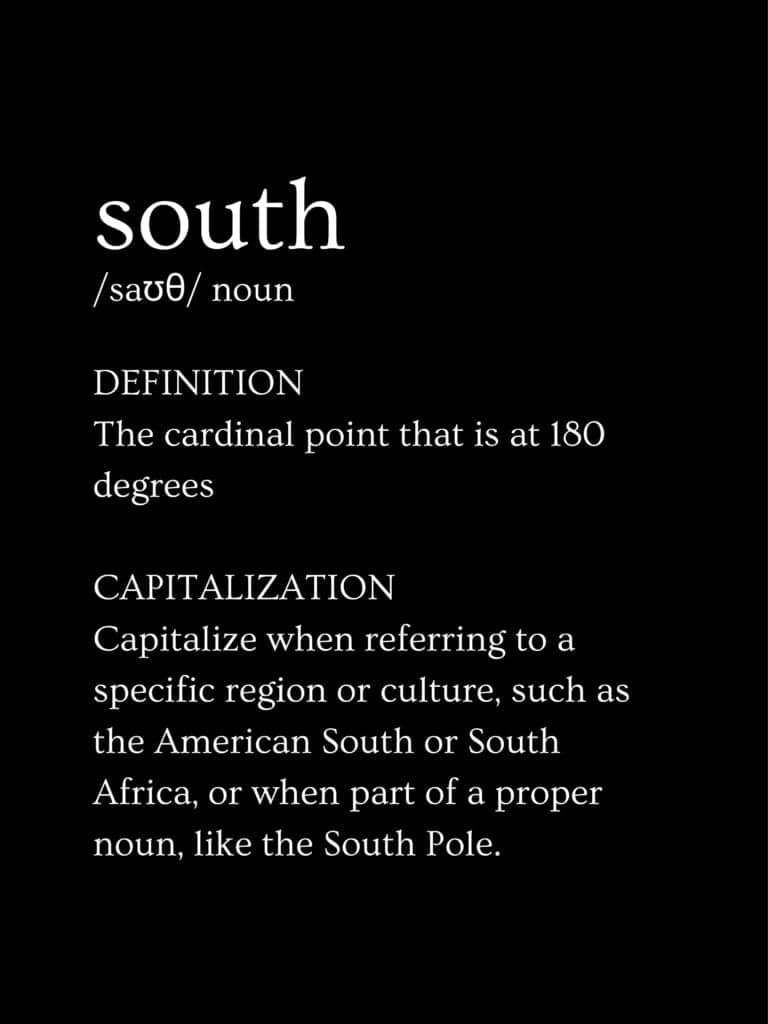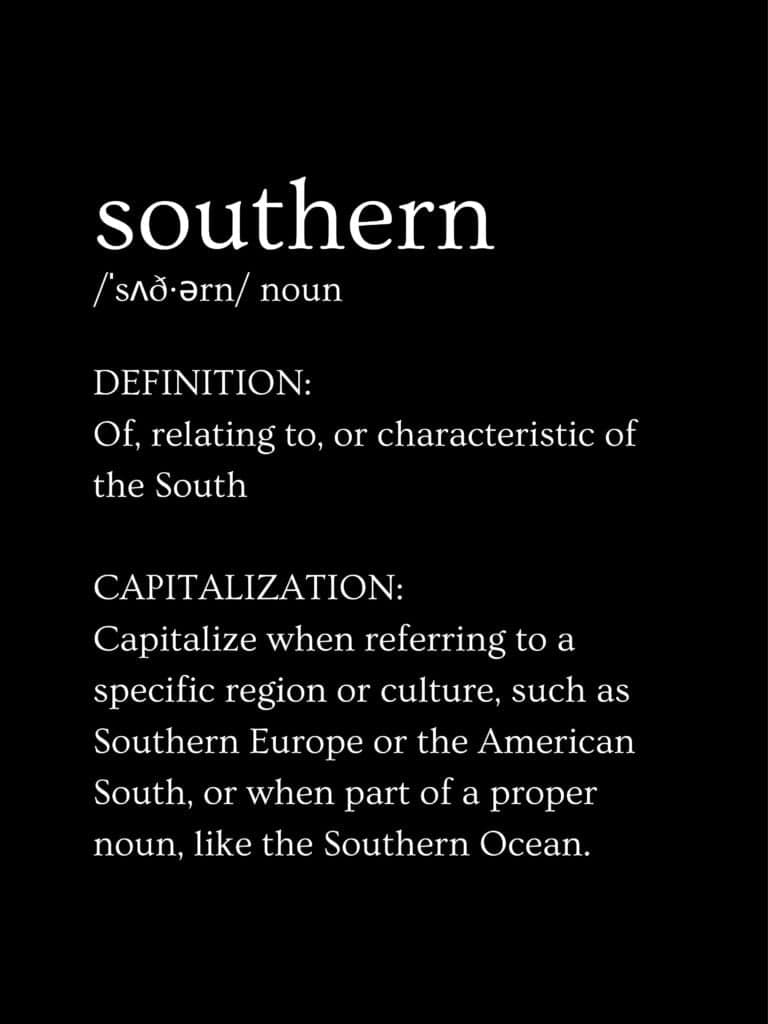Should Southern Be Capitalized? The Complete Guide + Free Printable Cheat Sheet
As someone who frequently writes about my beloved South and its unique traditions, I often grapple with seemingly minor yet important questions:
- Should ‘southern’ be capitalized?
- Do you capitalize ‘Southern United States’?
- When should ‘southeastern’ be capitalized?

These small details can cause quite a conundrum, making ‘southern,’ ‘southeastern,’ and their variations some of the most frequently questioned words in my writing journey!
I still remember the time I submitted a term paper in my Southern Literature course and got it back with red marks all over my “southern” and “South” references. That experience taught me that these rules aren’t just grammar technicalities—they reflect our region’s distinct cultural identity and heritage.
Quick Answer: When to Capitalize “Southern”
Yes, capitalize “Southern” when:
- It’s part of a proper noun (Southern United States, Southern Baptist Convention)
- It refers to the cultural region (Southern cuisine, Southern literature)
- It appears at the beginning of a sentence
No, don’t capitalize “southern” when:
- It’s a simple compass direction (southern exposure, travel south)
- It’s a general descriptor (southern part of the state)
- It refers to hemispheres (southern hemisphere)
Complete Rules for Capitalizing “Southern”
1. Capitalize When It’s Part of a Proper Noun
Capitalize “Southern” when it forms part of a proper noun, including:
Geographic regions and places:
- The Southern states are known for their hospitality.
- She was born in the Southern Appalachian region.
- We’re planning a road trip through the South Carolina Lowcountry. (Note the capital “L” for this specific region!)
Cultural traditions and cuisines:
- Southern cuisine is famous for its comfort foods.
- The traditions of Southern weddings are quite unique.
- She’s writing a book about authentic Southern cooking.
Titles of shows, books, movies:
- They love watching reality shows like ‘Southern Charm.’
- The book ‘Southern Hospitality: A Memoir’ explores the author’s roots.
- Have you read “Southern Living” magazine’s latest issue?
Organizations and Groups:
- He is a member of the Southern Historical Association.
- The Southern Baptist Convention held their annual meeting.
- She attended the University of Southern Mississippi.
2. Capitalize at the Start of a Sentence
Always capitalize ‘Southern’ and ‘South’ when they appear at the beginning of a sentence:
- South is the direction opposite to north on the compass.
- Southern states in the US are known for their hospitality.
3. Don’t Capitalize for Simple Compass Directions
DO NOT capitalize ‘south’ or ‘southern’ when simply describing a location or compass direction:
- The southern border of the property is lined with tall pine trees.
- She watched the sunset in the southern sky.
- We’re heading south for vacation next month.
4. Geographic Regions: It Depends
For geographical regions, follow these guidelines:
Lowercase when referring to a general direction within a region:
- If you drive south from Washington, D.C., you’ll reach Richmond.
- We are planning a trip to the southern part of Florida this summer.
- The southern Tennessee mountains get less snow than their northern counterparts.
Capitalize when referring to a recognized cultural/historical region:
- He plans a road trip through the Southern Appalachians.
- Many retirees move to the South for its warmer climate.
- The Deep South includes states like Mississippi, Alabama, and Georgia.
5. General Adjectives: Use Lowercase
Do not capitalize ‘south’ or ‘southern’ when using them as general adjectives:
- I’m looking for a southern-style restaurant.
- She enjoyed the warm climate of the southern states during summer.
- The house has beautiful southern exposure, perfect for growing tomatoes.

Capitalizing “South” vs. “Southern”
The rules for capitalizing “South” and “Southern” are similar, but with subtle differences:
“South” Capitalization Rules:
Capitalize when:
- Referring to the specific cultural/geographic region: “I grew up in the South.”
- Used in proper names: “South Carolina,” “South Korea”
- Starting a sentence: “South of the border lies Mexico.”
Don’t capitalize when:
- Indicating direction: “We drove south on I-95.”
- Used as a general descriptor: “The south end of the lake”
- Referring to hemispheres: “Countries in the south hemisphere”
“Southern” Capitalization Rules:
Capitalize when:
- Referring to the cultural region: “Southern cooking”
- Part of proper names: “Southern Methodist University”
- Starting a sentence: “Southern winds will increase tomorrow.”
Don’t capitalize when:
- Used as a general adjective: “The southern exposure gets good light.”
- Indicating hemispheric location: “southern hemisphere countries”
- Describing direction: “The southern route is faster.”
Is Southern Capitalized When Talking About Food?
This is one of the most common questions I receive, especially from fellow food bloggers!
Yes, capitalize when:
- Referring to the established cuisine of the region:
- “Southern cuisine features abundant fresh vegetables.”
- “She specializes in traditional Southern baking.”
- “Southern fried chicken is a comfort food staple.”
No, don’t capitalize when:
- Using as a general descriptor:
- “The restaurant serves southern-style barbecue.”
- “She adds a southern twist to classic Italian dishes.”
- “The cookbook features southern-inspired recipes.”
For dishes specifically associated with particular Southern regions, follow the same rule:
- “We enjoyed authentic South Carolina shrimp and grits.”
- “Tennessee whiskey adds flavor to this Memphis-style barbecue sauce.”
- “The Louisiana gumbo recipe has been in my family for generations.”
Southern recipes coming soon! Sign up for my newsletter to be the first to know when my Southern Cooking Essentials collection launches!
Special Cases: Southeastern, Southbound, and More
When to Capitalize “Southeastern”:
Capitalize when:
- Referring to a specific region: “The Southeastern United States”
- Part of an organization name: “Southeastern Conference (SEC)”
- Beginning a sentence: “Southeastern states often experience hurricanes.”
Don’t capitalize when:
- Used as a general directional term: “The southeastern corner of Wyoming”
- Describing a general area: “The southeastern coast of Spain”
In North Carolina and Georgia, you’ll often see “Southeastern” capitalized more frequently than in other parts of the country, showing how regional these conventions can sometimes be.
Rules for “Southbound”:
Capitalize when:
- Beginning a sentence: “Southbound traffic was congested.”
- Part of a proper name: “The Southbound Express Train”
Don’t capitalize when:
- Indicating direction: “Take the southbound lane.”
- Used as a general descriptor: “The southbound migration of birds”
Other Directional Terms:
The same principles apply to all directional terms (northern, eastern, western):
- Capitalize when referring to specific regions or in proper names
- Use lowercase for general directions and descriptions
Do You Capitalize “North” and “South” When Talking About The Civil War?
Yes, when referring to the sides in the Civil War, capitalize “North” and “South” as they represent specific entities:
- “The South seceded from the Union in 1861.”
- “The North’s industrial capacity gave it advantages in the later years of the war.”
- “Southern plantation owners feared economic changes.”
- “Northern abolitionists advocated for immediate emancipation.”
However, when using these terms as simple directional indicators even in Civil War contexts, keep them lowercase:
- “The armies marched north toward Gettysburg.”
- “Supply lines stretched from northern factories to southern battlefields.”
Is Southern Hospitality Capitalized?
“Southern hospitality” is typically written with only “Southern” capitalized when referring to the cultural concept and unique tradition of the American South. This capitalization acknowledges that Southern hospitality isn’t just friendly behavior—it’s a distinct cultural institution with defined traditions and expectations.
Examples:
- “She embodies the warmth of Southern hospitality in everything she does.”
- “Our B&B offers authentic Southern hospitality to every guest.”
- “The article explores how Southern hospitality has evolved over generations.”
Mind Your Capitals
. . . and Your Manners
Southern hospitality isn’t just polite — it’s powerful.
Discover easy ways to weave it into everyday life in my Southern Hospitality collection.
Should Southern California Be Capitalized?
Yes, “Southern California” should be capitalized because it refers to a specific geographic region with cultural significance. The same rule applies to other recognized regional designations:
- Southern California
- Northern Virginia
- Eastern Shore (of Maryland)
- Western North Carolina
- Central Florida
However, when using these terms simply as directional descriptors, keep them lowercase:
- “We visited the southern parts of California last summer.”
- “The western regions of the state receive more rainfall.”

Academic and Professional Style-Guide Rules
Different style guides have specific requirements:
AP Style Guide:
- Capitalize “Southern” when referring to the U.S. region
- Lowercase “southern” for general directional references
Chicago Manual of Style:
- Capitalize recognized geographical regions (the South)
- Lowercase directional terms (southern exposure)
MLA Style:
- Capitalize established cultural regions (Southern literature)
- Lowercase general compass directions
If you’re writing for publication, always check the specific style guide requirements. Many Southern publications have their own internal style guides with regional preferences.
Digital Writing and SEO Considerations
In online content, capitalization affects readability and professionalism:
- Search engines treat “southern” and “Southern” as the same word
- Consistent capitalization improves reader experience
- Well-formatted text appears more trustworthy to readers
- For URLs, lowercase is standard practice (southernhospitality.com)
When writing for digital platforms, maintaining consistency is key—choose your capitalization style and apply it throughout your website or publication.
How to Politely Correct Southern Capitalization
We all encounter incorrect capitalization, especially when it comes to Southern terms. Here’s how to address these errors with grace:
- Lead with appreciation: “I loved your article about Southern cooking traditions…”
- Frame it as helpful information: “I thought you might be interested to know that ‘Southern’ is typically capitalized when referring to our region’s cuisine.”
- Provide the reason: “It’s capitalized because it refers to the specific cultural region rather than just a direction.”
- Keep it light: “It’s one of those tricky grammar rules we all navigate!”
- Express good intentions: “I hope this is helpful for your future writing about our wonderful Southern traditions.”
Remember, even grammatical corrections can be delivered with that signature Southern warmth we’re known for!
My Southern Perspective
As someone who writes about Southern food, traditions, and hospitality daily, I’ve developed a deep appreciation for the nuances of these capitalization rules. When I first started my blog, I inconsistently capitalized “southern” throughout my posts, until a kind reader from Charleston gently pointed out the distinction.
These aren’t just arbitrary rules—they reflect the unique cultural significance of our region. When we capitalize “Southern” in reference to our food, traditions, and way of life, we acknowledge that these aspects of our culture have a distinct identity worth recognizing.
And I’ll be honest—you might still find some inconsistencies in older posts here on Scribbles and Grits! I’m gradually updating them as I continue learning and refining my own writing. We’re all on this grammar journey together, and I find that comforting.
Whether you’re a fellow Southerner documenting our shared heritage or someone trying to follow proper grammar rules, I hope these guidelines help you navigate these tricky waters with confidence!
Free Printable Southern Capitalization Cheat Sheet
Want these rules at your fingertips? Download my free Southern Capitalization Cheat Sheet with all these guidelines in an easy-to-reference format. Perfect for writers, students, and anyone who wants to get it right!
Scribble of the Day: Capitalization Quote

Have you ever had a capitalization conundrum when writing ‘southern,’ ‘south,’ or ‘southeastern’? What’s your funniest or most frustrating experience with these tricky rules? Share with us in the comments below!









